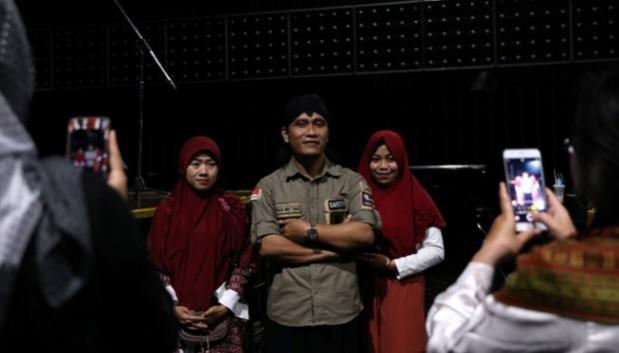
Mifta'im An'am Maulana Habiburrohman is not your typical Muslim preacher.
Instead of a skull cap, he wears a Javanese head dress over his 1980s-style mullet. His sermons are delivered in nightclubs instead of mosques.
With an eye on rising intolerance of "vice" in the world's largest Muslim-majority country, Habiburrohman said he upholds the right of worship for people who feel unwelcome in their community mosque because they work in clubs and bars.
"I rarely talk about heaven or hell because I believe they already know about that," said the 37-year-old preacher who also goes by the name Gus Miftah.
"There are job demands and life demands that push them to do these jobs to survive," he told Reuters before delivering a sermon to a group of mostly female employees at the Boshe VVIP karaoke bar and dance club on the island of Bali.
"I have no right to judge them ... so I'm here to help them never forget their God," he said.
Gus Miftah also operates an Islamic boarding school in Yogyakarta, his hometown on the island of Java. Conservative groups there say his preaching in clubs and red light districts is an insult to the Muslim religion.
Hardline Islamic groups have stepped up raids on bars and clubs in recent years, and have targeted sex workers and members of the LGBT community who work in entertainment zones.
Indonesia has the world's largest population of Muslims, and sizable Buddhist, Christian and other religious minorities, but conservative and hardline interpretations of Islam have fanned fears that the officially secular nation is becoming less tolerant.
Last year, Jakarta's ex-governor, an ethnic Chinese Christian, was tried and jailed for blasphemy after Muslim groups accused him of insulting Islam when he mentioned the Koran in a speech.
In August, an ethnic Chinese Buddhist woman who complained that a mosque's calls to prayer were too loud was jailed for 18 months after hardline groups accused her of blasphemy.
Indonesia's Muslim clerics council was not available for comment. Indonesian media have quoted council members as saying Gus Miftah should follow established "rules and methods to conduct sermons".
Yudith Stevanni, a manager at the Boshe VVIP club, said she disagreed with those who say the club is not an appropriate site for religious teaching.
"In my opinion, it is just a venue. The lessons can be conducted anywhere," she said.
Club workers who listened to Gus Miftah's 90-minute sermon said they appreciated his humour and informal style.
"Even though we work like this, we still have religion and we still want to do good," said a 27-year-old female employee.
In another part of the room, a 25-year-old waitress wore a headscarf as she prayed. She said the session made her feel better about her work.
"My friends say my job is bad ... but the sermon has helped me through the criticism," she said, declining to give her name.

















